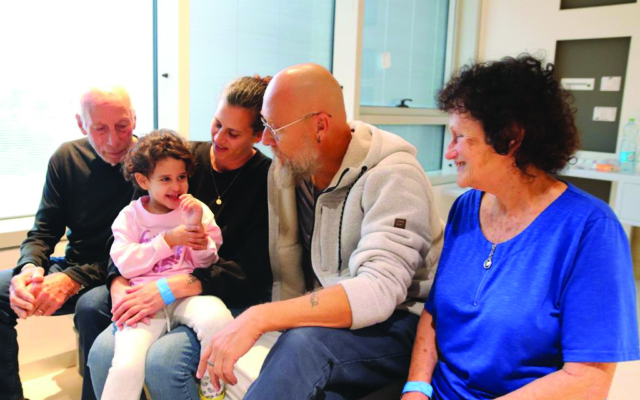Avigail Idan, now an orphan, is reunited with her aunt Liron, her uncle Zuli and grandparents Shlomit and Eitan at Schneider children’s hospital on November 27, 2023. (Schneider Hospital)
Gabe Friedman, Ron Kampeas, Ben Sales
(JTA) —In phases, Hamas released Israeli hostages into Egypt, a sign that the four-day ceasefire brokered between Israel and the terror group that runs Gaza would hold.
In the first release, 10 Thai nationals and one Filipino national were also released in a surprise additional deal that Egyptian officials said they had brokered. Thirty-nine Palestinian prisoners were released from Israel as part of the agreement, and multiple tankers of humanitarian aid entered the Gaza Strip.
After being driven to Egypt by the International Committee of the Red Cross via the Rafah border crossing. The hostages immediately underwent medical and psychological evaluations at Hatzerim Air Base.
According to reports, at least some of the hostages are not aware that they had family members killed on Oct. 7.
The temporary truce looked like it could have hit a snag, as the Israeli Defense Forces shelled parts of Gaza into the early hours of Friday, Nov. 24 and shot at Gazans attempting to return to the northern part of the coastal enclave. But Israeli military and Hamas forces held off from fighting at the agreed upon time on Friday, as did the Hezbollah terror group on Israel’s border with Lebanon.
On Tuesday, Nov. 21, Israel and Hamas agreed to a temporary ceasefire that involved, over the course of four days, the release of around 50 of the more than 200 Israelis who have been captured in Gaza since Oct. 7. Afterward, Hamas can extend the truce by releasing an additional 10 hostages a day. Along the way, Israel will release three Palestinian prisoners for every released hostage.
As the first hostages were en route to Israel, Hamas leader Ismail Haniyeh said, “Hamas will pursue its effort to halt the Israeli assault on Gaza” and “complete the prisoner exchange.”
President Joe Biden called a press conference to address the hostage release, noting that he was very involved in conversations with Israeli, Qatari, and Egyptian officials in the lead-up to Friday. He also called on the Israeli military to work to avoid further Palestinian casualties in Gaza and emphasized his continued push for a two-state solution.
“My expectation and hope is that as we move forward, the rest of the Arab world and the region is also putting pressure on all sides to slow this down, to bring this to an end as quickly as we can,” Biden said.
On Saturday, Nov. 25, Hamas released another 13 Israeli hostages after delays that resulted from Israel and Hamas accusing each other of bad faith and that put a temporary ceasefire at risk.
As part of the deal, Israel pledged to release a total of 150 Palestinian women and minors held in Israeli prison on security offenses.
Hamas scheduled the Saturday release for the afternoon and then delayed it, accusing Israel of delaying the delivery of humanitarian aid to Gaza, which was part of the deal, and of failing to release the longest-serving Palestinian prisoners. Israeli officials said the aid trucks had reached the Gaza Strip but were delayed by roads devastated by weeks of Israeli strikes. Israel said there was no formal agreement to release the longest-serving prisoners first.
Last-minute interventions by the governments of Egypt, the United States and Qatar, which has acted as an intermediary for Hamas, salvaged the transfer. President Joe Biden made calls to Egyptian and Qatari leaders to ensure that the release occurred.
The Red Cross picked up the hostages around 11 pm local time on Saturday and crossed the border into Egypt just before a midnight deadline that would have triggered the end of the ceasefire. Israeli media and the families of the hostages identified some of those released as they watched video of them getting out of ambulances in Egypt. They were transferred to Israeli territory within 30 minutes.
Many of the released hostages are from Kibbutz Be’eri, one of the communities hardest hit by Hamas’ massacre.
Survivors of the attack on Be’eri crowded around TVs at a Dead Sea hotel where the Israeli government has housed them since Oct. 7, cheering when they recognized friends on the live feed from Egypt.
Upon the delivery of the hostages, Be’eri officials also accused Hamas of bad faith, noting that it had promised to keep families united and noting that Hila Rotem Shoshani’s mother remains captive.
On Sunday, Nov. 26, Hamas released 17 more hostages — 14 Israelis, including one U.S. citizen, and three foreign nationals — to the Red Cross as part of its agreement with Israel to pause the fighting in the Gaza Strip.
In total, the terror group has released (at press time) 40 Israeli hostages, nearly all of them women and children, to Israel.
Hamas had released a total of 18 foreign hostages, nearly all Thai, under a separate agreement reached by the Thai government via Iran.

